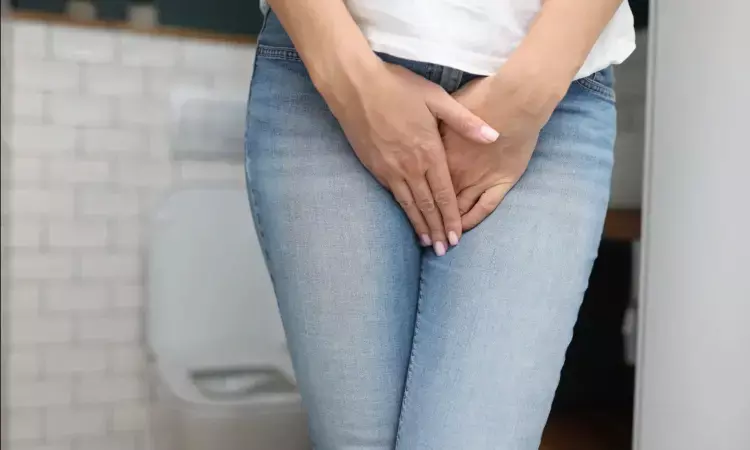- Home
- Medical news & Guidelines
- Anesthesiology
- Cardiology and CTVS
- Critical Care
- Dentistry
- Dermatology
- Diabetes and Endocrinology
- ENT
- Gastroenterology
- Medicine
- Nephrology
- Neurology
- Obstretics-Gynaecology
- Oncology
- Ophthalmology
- Orthopaedics
- Pediatrics-Neonatology
- Psychiatry
- Pulmonology
- Radiology
- Surgery
- Urology
- Laboratory Medicine
- Diet
- Nursing
- Paramedical
- Physiotherapy
- Health news
- Fact Check
- Bone Health Fact Check
- Brain Health Fact Check
- Cancer Related Fact Check
- Child Care Fact Check
- Dental and oral health fact check
- Diabetes and metabolic health fact check
- Diet and Nutrition Fact Check
- Eye and ENT Care Fact Check
- Fitness fact check
- Gut health fact check
- Heart health fact check
- Kidney health fact check
- Medical education fact check
- Men's health fact check
- Respiratory fact check
- Skin and hair care fact check
- Vaccine and Immunization fact check
- Women's health fact check
- AYUSH
- State News
- Andaman and Nicobar Islands
- Andhra Pradesh
- Arunachal Pradesh
- Assam
- Bihar
- Chandigarh
- Chattisgarh
- Dadra and Nagar Haveli
- Daman and Diu
- Delhi
- Goa
- Gujarat
- Haryana
- Himachal Pradesh
- Jammu & Kashmir
- Jharkhand
- Karnataka
- Kerala
- Ladakh
- Lakshadweep
- Madhya Pradesh
- Maharashtra
- Manipur
- Meghalaya
- Mizoram
- Nagaland
- Odisha
- Puducherry
- Punjab
- Rajasthan
- Sikkim
- Tamil Nadu
- Telangana
- Tripura
- Uttar Pradesh
- Uttrakhand
- West Bengal
- Medical Education
- Industry
Women with Genetic Predisposition to Depression More Likely to Experience Nocturia and Incontinence: Study Suggests

UK: A recent study published in European Urology has found that women with a higher genetic predisposition to depression, anxiety, and neuroticism are more likely to experience lower urinary tract symptoms (LUTS), including urinary incontinence and nocturia.
Traditionally, research connecting psychiatric conditions to LUTS has faced challenges from confounding factors like lifestyle, medication use, and subjective reports. However, by using genetic data instead of self-reported psychological states, the study provides a more objective and biologically based view.
The research, conducted by Zayn Rajan and colleagues from the Centre for Academic Mental Health, Population Health Sciences, University of Bristol, explored the genetic overlap between mental health and urinary symptoms, providing fresh insights into how psychological factors may influence bladder function.
The investigators analyzed data from the Avon Longitudinal Study of Parents and Children (ALSPAC), focusing on women who had given birth. Using polygenic risk scores (PRS)—a measure that captures the cumulative effect of multiple genetic variants linked to a trait—the team assessed the association between genetic susceptibility to depression, anxiety, and neuroticism with various urinary symptoms.
The study led to the following notable findings:
- Higher polygenic risk scores (PRS) for depression and neuroticism were significantly associated with nocturia, with odds ratios ranging from 1.21 to 1.33.
- Women with elevated genetic risk for neuroticism were more likely to experience urinary incontinence (OR 1.14), urgency (OR 1.12), and mixed urinary incontinence (OR 1.23).
- Increased genetic predisposition to anxiety was linked to a higher likelihood of mixed urinary incontinence (OR 1.20).
These results, consistent across multiple time points, suggest that mental health genetics could play a role in the development of urinary symptoms. The researchers noted that women with a higher genetic predisposition to neuroticism and depression are more vulnerable to nocturia and incontinence, reinforcing the connection between emotional well-being and bladder control.
Dr. Rajan and colleagues pointed out that mental health is rarely evaluated during clinical assessments of urinary symptoms, despite growing evidence that psychological distress and bladder dysfunction may share common pathways. Their work suggests that integrating mental health screening into urological care could enhance diagnosis and treatment outcomes.
The authors emphasized that, although the associations were significant, further research is needed to determine whether these relationships are causal and to investigate the underlying biological mechanisms. They also acknowledged that the study cohort, comprising primarily parous women of European ancestry, may limit generalizability.
Clinically, the findings highlight the importance of adopting a holistic approach to treating LUTS, one that considers not just urinary symptoms but also the individual’s mental and emotional health. Addressing coexisting depression or anxiety may improve treatment adherence and overall quality of life for affected women.
"The study highlights a novel genetic link between mental health traits and urinary tract symptoms, suggesting that the mind and bladder are more closely connected than previously understood," the authors concluded.
Reference:
Rajan, Z., Dardani, C., Burrows, K., Bastiani, O., Drake, M. J., & Joinson, C. (2025). Association of Polygenic Risk Scores for Depression, Anxiety, and Neuroticism with Lower Urinary Tract Symptoms Among Women. European Urology. https://doi.org/10.1016/j.eururo.2025.09.4154
Dr Kamal Kant Kohli-MBBS, DTCD- a chest specialist with more than 30 years of practice and a flair for writing clinical articles, Dr Kamal Kant Kohli joined Medical Dialogues as a Chief Editor of Medical News. Besides writing articles, as an editor, he proofreads and verifies all the medical content published on Medical Dialogues including those coming from journals, studies,medical conferences,guidelines etc. Email: drkohli@medicaldialogues.in. Contact no. 011-43720751
Next Story


